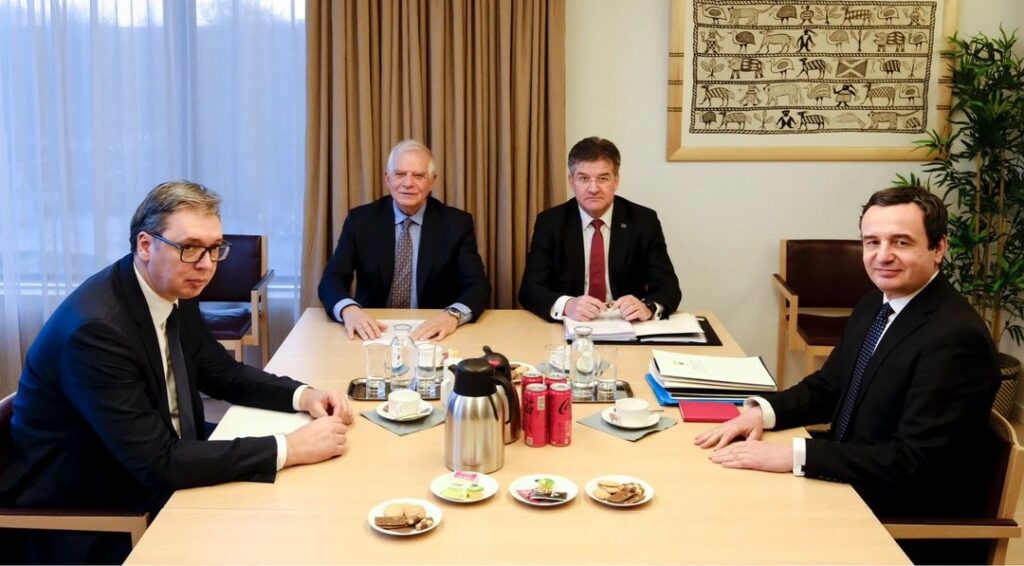The leaders of Serbia and Kosovo discussed on Monday an EU proposal on normalisation of the relations between the two countries, both aspiring to join the EU, at their first high-level meeting this year of the EU-facilitated Belgrade-Pristina dialogue.
The proposal, which has been in the making for a whole year, was published by the European External Action Service (EEAS) and is labelled “Agreement on the path to normalisation between Kosovo and Serbia”.
It has all the hallmarks of an agreement, including a brief preamble and 11 articles, but lacks the most important thing – the signatures of President Aleksandar Vučić of Serbia and Prime Minister Albin Kurti of Kosovo. On the positive side, the European Commission stressed that the EU proposal has been endorsed by all 27 member states at the latest European Council.
The proposal-agreement is without prejudice to the different view of the Parties on fundamental questions, including on status questions. The main issue of Serbia’s recognition of Kosovo’s independence – a condition for it to join the EU – is not mentioned. However, the two Parties commit to be guided by the UN charter and respect each-other’s independence, autonomy and territorial integrity.
According to the proposal-agreement, the two countries shall develop normal, good-neighbourly relations with each other and mutually recognise their respective documents and national symbols, including licence plates. As previously reported, the latter issue has sparked unrest and violence between them and derailed the dialogue.
Now, Serbia and Kosovo committed to settle any disputes between them exclusively by peaceful means and refrain from the threat of war. Importantly, Serbia will not object to Kosovo’s membership in any international organisation and neither Party will block, nor encourage others to block, the other Party’s progress in their respective EU path based on their own merits.
A stumbling block in their relations has been the issue of local self-government for the Serbian minority in northern Kosovo. The proposal-agreement says that the Parties will ensure an appropriate level of self-management for the Serbian community in Kosovo and ability for service provision in specific areas.
Until now, Kosovo and Serbia have apparently lacked mutual diplomatic representation but now they will exchange Permanent Missions according to the proposal-agreement.
In a statement, EU’s foreign policy chief Josep Borrell said that Serbia and Kosovo have expressed their readiness to proceed with implementation of the ‘Agreement’ but that further negotiations are needed to determine “specific implementation modalities of the provisions”, hinting to the proverbial devil in the details. He will convene another meeting between the two leaders in the course of March to finalise the discussions on the implementation.
For Borrell, the proposal-agreement is a significant step away from the almost daily crisis management and shuttle diplomacy which has characterized the Belgrade-Pristina Dialogue since last Summer. In his press remarks, he was pleased to announce that Vucic and Kurti had agreed “that no further discussions are needed on the EU proposal”.
While the two parties are prepared to proceed with the implementation of the proposal-agreement, Borrell is aware of the fact that “we have quite a long history of agreements that have not been implemented yet”. Shuttle diplomacy is therefore still needed.
The Commission spokespersons did not reply at the time of press to a request for replies to the following questions but some clarifications were made at the daily press briefing today (28 February).
Has the agreement been signed by the leaders of the two countries?
No. The Commission declined to explain why.
Does it include a Serbian commitment to recognize Kosovo's independence?
Not clear but apparently not.
Can the agreement can be changed or amended later?
Not clear. The agreement was described by Borrell as work in progress but it is not a breakthrough according to the Commission’s lead spokesperson for foreign affairs.
Are the parliaments in the two countries supposed to ratify the agreement?
Not clear
M. Apelblat
The Brussels Times

